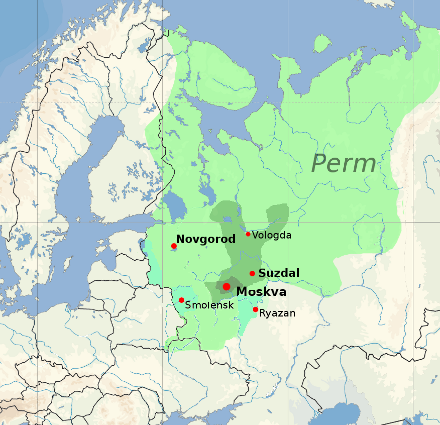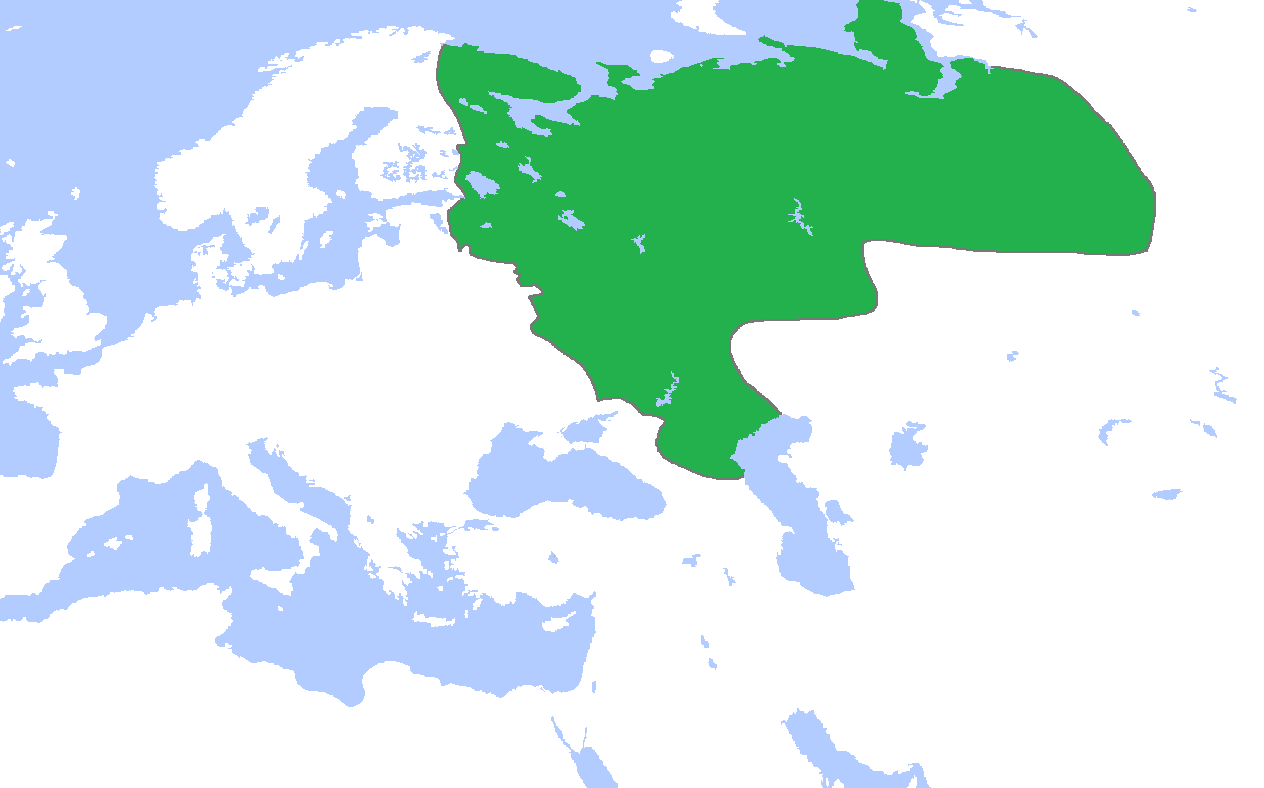- Poruka
- 5.190
Da li netko zna nešto o isotriji kneževine Vladimir-Suzdalj. Naime koliko ja shvaćam to je srce današnje Ruske države i jezika. Kneževina je od 1238. godine bila vazalna država Mongola/Zlatne Horde sve do 1480. godine. Glavni grad je bio Vladimir a zamjenila ga je Moskva u 14 stoljeću zaslugom Ivana Kalite. Kada i nastaje Velika Moskovka kneževina. 1487. godine Moskovska Kneževina uništava Novgradsku Republiku. Tek 1547. godine uzimaju naziv Rusija kada nastaje Rusko Carstvo. Moskovska kneževina se nazivala Muscovy i taj naziv je i ostao skoro do 18. stoljeća. Prvi poznati vladar Moskve je Danijel I (1303) koji je oženio sestru Uzbeg Kana, Zlatna Horda. Njegov sin Jurij Danilović je bio prvi Princ Moskve. Danijelov otac je bio Alekasndar Nevsky. O Aleksandru wiki kaže:
In 1237, however, the Tatar-Mongols came to the Suzdal region. All who bowed their heads, kissed the boots of the Khan, and gave up their citizenship remained alive and well; those who did not submit were destroyed. Vladimir princes Yuriy Vsevolodovich and Yaroslav Vsevolodovich submitted to Batu Khan. Thus, the land became part of the Genghisid Golden Horde empire and its military force merged with the Tatar-Mongols military.
During the military campaigns of Yuriy Vsevolodovich, his younger brother Yaroslav was seated as Prince. He gave his 8-year-old son Alexander Yaroslavich to Batu into amanat (hostages). While staying in the Horde from 1238 to 1252, Alexander learned the whole structure and customs, became "blood brother" to Batu's son Sartak, wed Batu Khan's daughter, and later became a loyal servant of the Golden Horde as head of the Vladimir principality (1252-1263). He was summoned by the Novgorodians to become knyaz (or prince) of Novgorod and, as their military leader, to defend their northwest lands from Swedish and German invaders.
https://en.wikipedia.org/wiki/Alexander_Nevsky
Znači Nevsky je sa 8 godina završio sa Mongolima i kod njih je boravio do svoje 22 godine. Postao je krvni brat sa Batu Kanovim sinom Sartakom, oženio je kćer Batu Kana. A njegov sin Danijel kćer Uzbeg Kana. To me ponukalo da malo istražim i naišao sam na ovo:
Conclusion
As the evidence stands, the effects of the Mongol invasion were many, spread across the political, social, and religious facets of Russia. While some of those effects, such as the growth of the Orthodox Church generally had a relatively positive effect on the lands of the Rus, other results, such as the loss of the veche system and centralization of power assisted in halting the spread of traditional democracy and self-government for the various principalities. From the influences on the language and the form of government, the very impacts of the Mongol invasion are still evident today. Perhaps given the chance to experience the Renaissance, as did other western European cultures, the political, religious, and social thought of Russia would greatly differ from that of the reality of today. The Russians, through the control of the Mongols who had adopted many ideas of government and economics from the Chinese, became perhaps a more Asiatic nation in terms of government, while the deep Christian roots of the Russians established and helped maintain a link with Europe. It was the Mongol invasion which, perhaps more than any other historical event, helped to determine the course of development that Russian culture, political geography, history, and national identity would take.
Kao i riječi u Ruskom koje potječu od Mongola:
below are a few examples of some that are still in use. All came from various parts of the Horde.
амбар ambar barn
базар bazar bazaar
деньги den’gi money
лошадь loshad‘ horse
сундук sunduk truck, chest
таможня tamozhnya customs
Izvor: http://www.sras.org/the_effects_of_the_mongol_empire_on_russia
- - - - - - - - - -
Mapa Moskovske kneževine
https://upload.wikimedia.org/wikipedia/commons/2/2d/Muscovy_1390_1525.png
Koliko ja shvaćam ruski jezik potjeće iz Novgoroda. Moskovska kneževina osvaja Novgorodsku Republiku u 15 stoljeću. Da li tada preuzimaju jezik?
Mapa Novgoroda:
https://en.wikipedia.org/wiki/File:Novgorod1400.png
Slika niže je posjeta Mongola Moskvi

In 1237, however, the Tatar-Mongols came to the Suzdal region. All who bowed their heads, kissed the boots of the Khan, and gave up their citizenship remained alive and well; those who did not submit were destroyed. Vladimir princes Yuriy Vsevolodovich and Yaroslav Vsevolodovich submitted to Batu Khan. Thus, the land became part of the Genghisid Golden Horde empire and its military force merged with the Tatar-Mongols military.
During the military campaigns of Yuriy Vsevolodovich, his younger brother Yaroslav was seated as Prince. He gave his 8-year-old son Alexander Yaroslavich to Batu into amanat (hostages). While staying in the Horde from 1238 to 1252, Alexander learned the whole structure and customs, became "blood brother" to Batu's son Sartak, wed Batu Khan's daughter, and later became a loyal servant of the Golden Horde as head of the Vladimir principality (1252-1263). He was summoned by the Novgorodians to become knyaz (or prince) of Novgorod and, as their military leader, to defend their northwest lands from Swedish and German invaders.
https://en.wikipedia.org/wiki/Alexander_Nevsky
Znači Nevsky je sa 8 godina završio sa Mongolima i kod njih je boravio do svoje 22 godine. Postao je krvni brat sa Batu Kanovim sinom Sartakom, oženio je kćer Batu Kana. A njegov sin Danijel kćer Uzbeg Kana. To me ponukalo da malo istražim i naišao sam na ovo:
Conclusion
As the evidence stands, the effects of the Mongol invasion were many, spread across the political, social, and religious facets of Russia. While some of those effects, such as the growth of the Orthodox Church generally had a relatively positive effect on the lands of the Rus, other results, such as the loss of the veche system and centralization of power assisted in halting the spread of traditional democracy and self-government for the various principalities. From the influences on the language and the form of government, the very impacts of the Mongol invasion are still evident today. Perhaps given the chance to experience the Renaissance, as did other western European cultures, the political, religious, and social thought of Russia would greatly differ from that of the reality of today. The Russians, through the control of the Mongols who had adopted many ideas of government and economics from the Chinese, became perhaps a more Asiatic nation in terms of government, while the deep Christian roots of the Russians established and helped maintain a link with Europe. It was the Mongol invasion which, perhaps more than any other historical event, helped to determine the course of development that Russian culture, political geography, history, and national identity would take.
Kao i riječi u Ruskom koje potječu od Mongola:
below are a few examples of some that are still in use. All came from various parts of the Horde.
амбар ambar barn
базар bazar bazaar
деньги den’gi money
лошадь loshad‘ horse
сундук sunduk truck, chest
таможня tamozhnya customs
Izvor: http://www.sras.org/the_effects_of_the_mongol_empire_on_russia
- - - - - - - - - -
Mapa Moskovske kneževine
https://upload.wikimedia.org/wikipedia/commons/2/2d/Muscovy_1390_1525.png
Koliko ja shvaćam ruski jezik potjeće iz Novgoroda. Moskovska kneževina osvaja Novgorodsku Republiku u 15 stoljeću. Da li tada preuzimaju jezik?
Mapa Novgoroda:
https://en.wikipedia.org/wiki/File:Novgorod1400.png
Slika niže je posjeta Mongola Moskvi

Poslednja izmena:






